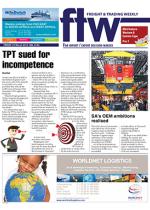The drop in commodity
prices will be one of the major
challenges facing the global
economy this year – with
Africa especially hit due to
its high production of iron
ore and oil. But the good
news is that sub-Saharan
Africa (SSA)
is becoming
increasingly
less dependent
on commodity
prices for its
economic
survival.
“Although
the region’s
economic
growth rates for
2015 have been
downgraded
by the
International
Monetary Fund
(IMF) from 5.8% to 4.9%
– on the back of falling oil
prices – a number of countries
in sub-Saharan Africa are
increasing their diversity
through recent structural
changes to their economies,”
said Dr Lyal White, director:
Centre for Dynamic Markets
at the Gordon Institute of
Business Science (Gibs).
He added that, despite
the downgrade, SSA had
outstripped global growth
every year for the past 15 years
and Africa would continue to
surpass international growth
averages by between 2% and
3%.
So that’s the
good news. But
White cautions
that the many
challenges
affecting the
global economy
will impact
Africa too.
“In 2015,
increasingly
more African
markets will
be exposed
to structural
deficiencies
(such as a lack of skills to
implement a structural
change in the economy),
progressively weaker
institutions and poor
competitive performance,” he
commented.
Market uncertainty in
the European
Union, China’s
major growth
slowdown – the
biggest since
1990 – and a lack
of clarity around
the renewal by
the United States
of the African
Growth and
Opportunity
Act (Agoa) could
significantly
impact SSA’s
forecast growth.
“Furthermore,
there are some
important
elections coming
up in key African
markets and the
world is holding
its collective
breath to see how
well these go.
Unfortunately,
if socio-political
issues arise on
the continent,
most African
countries are
tarred with the
same brush,” he
pointed out.
INSERT & CAPTION
The continent
hasn't built up the
necessary trade
institutions to ride
out the global
market volatility.
– Dr Lyal White

